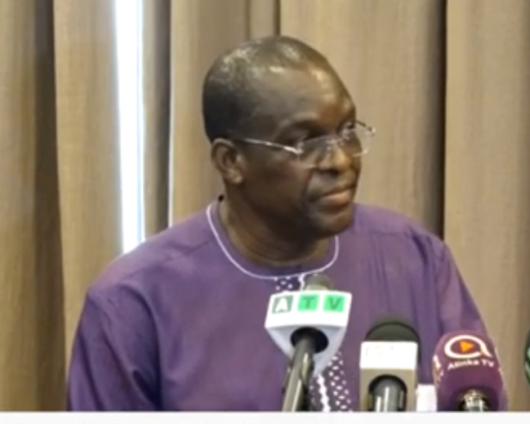Speaker of Parliament Alban Bagbin has attributed the delay in the passage of the Affirmative Action Bill to constant revision of the bill and low commitment by successive governments.
Speaking at a consultative forum on the theme “Strengthening women’s inclusion in governance and the urgency of the affirmative action”, Mr Bagbin noted that the practice of shelving bills by government following the dissolution of its Parliament has played a major factor.
“…how come Ghana, since 1998 when the guidelines on the Affirmative Action were passed by Cabinet. Still, not passed the law...this has largely been attributed to the low commitment on the part of some stakeholders including Parliament towards pushing for the passage into law. The story has always been a revision. They are always revising the law and I just told you, Cabinet will have to validate it before it is brought to Parliament.
“We are following some old British practice where legislation before Parliament dies with the Parliament. And so all the bills they put before us, immediately we end a four-year term, the bills also end with the four-year term. I don't know where this is coming from,” he said.
Mr Alban Bagbin who supported the calls to expedite the legal processes to pass the bill into law noted that the country can only boast of effective democratic governance when it prioritises the substantial representation of women in decision-making institutions.
Iterating the words of Ngũgĩ wa Thiong'o that states “the condition of women in a nation is the real measure of its progress,” he further entreated Ghanaians to reevaluate their notion of Ghana being a developing country and a model to the rest of Africa.
“Women in governance will be excellent role models for the Ghanaian girl child and young women to aspire to higher levels in politics. There can be no argument or so whatever about the fact that our democracy will only be as strong and effective as the participation of women in policy making. When the participation of women is weak and ineffective, our democracy will also remain weak and ineffective.
“So the claim that we have been making in Ghana, we are developing, we are a model, please let us reevaluate ourselves and the conditions in the country,” he added.
Speaker Alban Bagbin, touching on the gender representation of women in Parliament, called on political parties to invest in female candidates. He also entreated electorates to give these female candidates an opportunity to prove their worth.
Efforts to create space for women according to him would remain unsuccessful should Ghanaians keep hold of a mindset that disadvantages females.
“The plain truth is that under our current system, the responsibility of sending more women to Parliament rests with the political parties and voters, which means we need to go beyond that.
“Using the mixed proportional representation system will not do any harm to us, therefore, we need to relook at some of the legal frameworks that we have in the country. If the parties decide to bring in more women candidates, perhaps Parliament may likely be able to get a higher percentage of women.
"The way we are going, if we don't relook at these issues and we depend on some misunderstanding of what democracy means, we will never get there,” he said.
Meanwhile, Alban Bagbin has given the assurance that his outfit would ensure the passage of the Affirmative Action Bill into law and therefore called on the support of the general public.
“.... Ghana's Parliament, we are looking forward seriously to the passage of the Affirmative Action Bill which aims at offering women 50 per cent quota. I hope you will support us.
“When passed, the law will ensure that over time, Ghana will take its place among the countries with the highest women representation in decision making institutions,” he stated.
As part of steps to ensure a fair representation of women in state institutions, Executive Director of the Institute for Democratic Governance (IDEG), Dr Emmanuel Akwetey has called for structural reforms to accommodate more women in leadership, particularly at the Local Assembly level.
In 1959, the Ghana Parliament passed the representation of the people women members’ act which enabled the President to increase the number of women in Parliament to 10 in 1960.
Latest Stories
-
Clifford Danquah crowned Betway Ghana’s first Aviator Legend, walks away with GHS 500,000
34 seconds -
Uphold integrity – Shamima Muslim urges young political communicators
8 minutes -
50 roads under Big Push to start this year – Alhassan Suhuyini
9 minutes -
Ghana to improve infrastructure to support Recreation agenda – Kofi Adams
16 minutes -
Analysis: What’s in the NDC’s first mid-year budget review
21 minutes -
ENI applauds Ghana’s investment climate as government pledges stronger support for energy growth
22 minutes -
OmniBSIC Bank returns for 2025 JoySports Invitational Tournament
40 minutes -
Photos: Ghana defeat Niger to finish third in WAFU-B U20 Boys Cup
1 hour -
Star Assurance signs up for JoySports Invitational Tournament
2 hours -
Indigenous firm Dutylex partners with Petro-Canada Lubricants to expand footprint in Africa
2 hours -
JAPTU Ghana pays courtesy call on IGP Yohuno, POMAB members
2 hours -
The healers who were left behind: A tale from Nunyãdume
2 hours -
Telecel bridging digital divide through KNUST SONSOL Programme
2 hours -
2025 Mid-Year Budget: Trade expert calls for single-digit inflation to strengthen economy
3 hours -
From Doubt to Dreams: Telecel’s 2Moorch Money Promo changes a nurse’s life
3 hours

